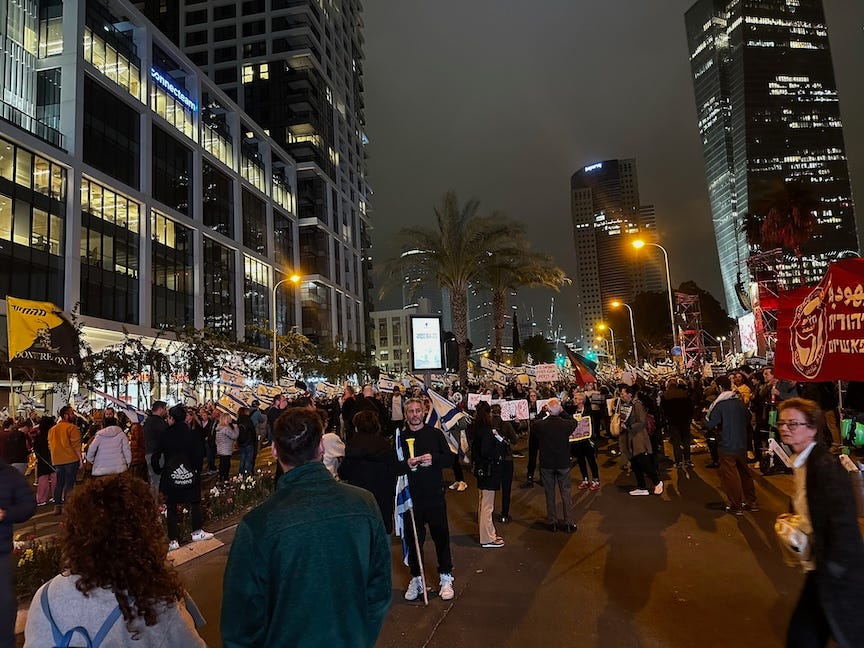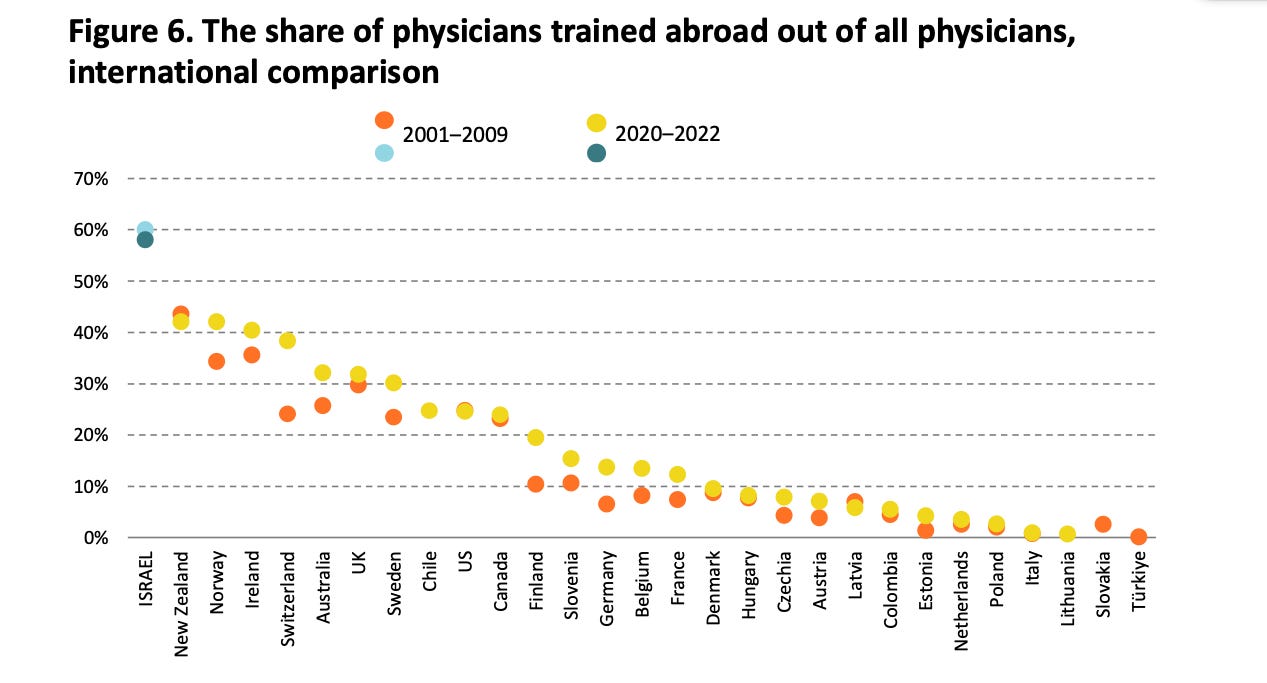DAY 148 OF THE GAZA WAR: Heavy Fighting in Gaza, Why Don't Ultra Orthodox Serve?Protests, Eurovision
Tel Aviv Diary, March 2, 2024
ZOOM Briefing Sunday March 3: 6 PM Israel time, 4 PM GMT, 11 AM EST, 8 AM PST. Invitations will go out in the morning.
HOSTAGE NEGOTIATIONS
Negotiators await a response from Hamas. The US asserts that Israel has agreed to the terms presented to Hamas. However, before Israel commits to finalizing the agreement, it demands to know how many hostages are alive, and how many will be released. Although Qatar has pledged to secure this information, so far, they have yet to deliver any results.
This week, families of the hostages organized a march from the Gaza area to Jerusalem, where they staged a demonstration tonight outside Prime Minister Netanyahu's residence.
GAZA WAR
Two days ago, I reported that the IDF Paratroop Brigade left Gaza, where they had been deployed since the start of the war. They were replaced by a brigade comprised of cadets from the Unit Commanders’ course. This new squad entered a building that was booby-trapped with explosives. Once inside, the bombs were detonated, killing three soldiers, Sgt. Dolev Malka, 19, Sgt. Afik Tery, 19, Sgt. Inon Yitzhak, 19, and wounding 14 others.
Sadly, this incident underscores the cost of deploying inexperienced troops who lack familiarity with the conditions in Gaza. The building was located in the eastern sector of Khan Younis, closer to Israel's border, in an area where we had not operated until now.
This is how the IDF spokesman summarized other events of the last day in Gaza:
Within minutes, the IDF attacked the launch area from which the barrage towards the Zikim area was fired last night; a terrorist cell that loaded weapons onto a vehicle driving close to the forces was eliminated.
Following the launch last night (Friday) from the Gaza Strip towards Israeli territory, aircraft attacked the launch area in the northern Strip from which the launch was carried out and several additional targets, including launch pits and terror infrastructures used by the Hamas terror organization, under the direction of the Southern Command's fire center.
Fighters from the 7th Brigade combat team continue to operate in the west of Khan Younis, and in the last day, they eliminated terrorists and located weapons in the area, including explosives, grenades, Kalashnikov rifles, and vests. In addition, in a series of aerial strikes, the brigade's fire complex directed aircraft that eliminated eight terrorists, including terrorists who were carrying a suspicious object resembling an explosive device close to the forces.
In the central Strip, the combat team of the Nachal Brigade neutralized about twenty terrorists over the last day. In one of the operations, the brigade's fire complex identified a terrorist cell loading weapons onto a vehicle that began to move close to the forces, the fire complex directed aircraft that encircled them and eliminated them. In another operation carried out by the forces, several terrorist cells close to the forces were identified and, in cooperation with the brigade's fire complex and ground forces, the cells were eliminated.
In the last day, the 215th Artillery Brigade directed aircraft that attacked and killed three terrorists in the Rimal neighborhood. In addition, in response to the launches the day before yesterday to Sderot, the forces directed aircraft that attacked a terror infrastructure from which the launches were carried out.
In the central Strip, fighters from the 'Refa'im' multi-dimensional unit continue to operate, and in the last day, the forces eliminated several terrorists using innovative attack means.
USA
President Biden is clearly no longer prepared to depend solely on Israel for delivery of humanitarian aid to Gaza and therefore, Biden composed the following statement:
In the coming days, the United States will carry out airdrops of aid to Gaza, redouble our efforts to open a maritime corridor and expand deliveries by land.
The aid flowing into Gaza is nowhere near enough.
We all need to do more. And the United States will do more.
Today, three US aircraft dropped food into Gaza. As I have said before, it’s a mistake for Israel not to be more proactive with such aid initiatives.
Freshman Senator John Fetterman has turned out to be one of Israel’s staunchest supporters. He tweeted yesterday regarding the casualties at the humanitarian aid convoy:
I reject statements from nations with atrocious human rights records: China, Saudi Arabia, and Turkey.
Without a doubt, this is a humanitarian tragedy. Hamas alone owns this calamity.
We must demand Hamas free the hostages and surrender—ending suffering, death and chaos.
LEBANON-SYRIA
On Friday, an airstrike resulted in the death of a senior Iranian advisor to Syria and Hezbollah. The Iranians confirmed the loss, along with the deaths of two high-ranking Hezbollah advisors. On Saturday, the IDF killed three terrorists affiliated with Iran, while they were driving in southern Lebanon.
USE OF PHONES ON SHABBAT
The current war began on Simchat Torah, when Israel was bombarded with a massive rocket attack. Many religious Jews found themselves reaching for their phones, either to find out what was happening, or to respond to calls for reserve duty. For many of them, the act of reaching for their phones did not end on that day. According to a survey conducted by the Jerusalem Post, 68% of religious respondents now keep their phones on during Shabbat. 57% admit to corresponding more on Shabbat, and 56% state they now text on Shabbat. Women are more likely to use their phones, with 72% reporting phone usage on Shabbat, compared to 65% of men. Older people were more inclined to use their phones than the younger demographic. There’s a clear difference between different groups: 77% of those who define themselves as Traditional (Masorti) use their phones; compared to 11% of people who define themselves religious. Only 6% of those who identify as ultra-Orthodox 6% admit to using their phones on Shabbat.
WHY DON’T THE ULTRA-ORTHODOX SERVE IN THE IDF?
First, let's examine Jewish law. Jewish law is explicit. In the case of a “milchemet chovah” (obligatory war, one for defense), the Mishnah dictates that even a groom must leave his bride at the altar to fight. Clearly, all of the wars Israel has fought have been defensive, which raises the question of why they do not serve. There are two aspects to this conundrum: the legal and the social.
Historically, the practice of exempting for Yeshiva students from military service began even before the establishment of the state. In February 1948, the heads of the Yeshivas in Israel met with the pre-state defense committee and requested postponement of the Yeshiva students conscription. Despite the urgent need for soldiers, they argued that drafting these students would result in the closing of the Yeshivas, which were struggling to revitalize a community devastated by the Holocaust.
One month later, Israel Galili, responsible for the national command center of the Haganah, sent out the following order:
All yeshiva students, according to approved lists, are exempt from military service. Students who are capable will be given training in self-defense at their place of study… This decision is valid for the duration of the year 1948, and at the end of the year, the issue will be re-examined.
The issue of conscripting Yeshiva students was not revisited, and in January 1951, following the end of the War of Independence, Ben Gurion wrote to the Army commander Yigal Yadin. Citing Section 12 of the Security Service Law, Ben Gurion stated he had granted an exemption to yeshiva students from regular service duties. This exemption applied only to yeshiva students actively engaged in Torah study within a Yeshiva, and was contingent on their continued study there. At the time it was issued, Ben-Gurion’s letter impacted 400 Yeshiva students.
In 1977 when Menchem Begin came to power he lifted any numerical limits to the number of exemptions.
In 1998, a Supreme Court ruling in the case of Rubinstein v. The Minister of Defense determined that there was no legal justification for exempting ultra-Orthodox men from the draft. (The “National Service Law” included provisions not to draft religious women, and married, or pregnant women). As a result, Prime Minister Barak appointed a committee, led by Supreme Court Justice Tal. Following the committee’s deliberations, the “Tal Law” was enacted in January 2002. The “Tal Law” permitted full-time yeshiva students to defer their conscription into the IDF until age 23. After reaching age 23, yeshiva students could choose to participate in a shortened, 16-month period of IDF service; complete a year of civilian national service; or continue full-time Yeshiva study. This legislation required renewal every five years.
In 2012, the Supreme Court declared the “Tal Law” unconstitutional. Consequently, in 2014, the government coalition, which did not include ultra-Orthodox parties, enacted legislation mandating that a greater portion of ultra-Orthodox men had to be drafted every year. By 2017 the percentage of ultra-Orthodox men drafted into the IDF had to reach 60%. Failure to reach the 60% target would result in penalties, leading to the conscription of all ultra-Orthodox men. However, these penalties were never enforced. Moreover, when the ultra-Orthodox parties joined the Netanyahu government in 2015, the penalties were abolished. In September 2017, the Supreme Court struck down the 2014 law, saying it violated the principles of equality. Since then, the government has been able to receive extensions from the Supreme Court, as Israel went through five national elections. These extensions have now expired, and that is where we stand legally.
The social dimension of this issue is actually very straightforward. Haredi society is centered on isolation, particularly for their young men. Haredim fear that if their young men were to serve in the army, they would be exposed to the broader world around them, and a significant percentage might choose not to return to in the insular that ultra-Orthodox community. Today, it is estimated that there are 70,000 Yeshiva students with exemptions.
EUROVISION
There has been a major controversy over whether Israel will be allowed to participate in this year’s Eurovision Song Contest. The European Broadcasting Union (EBU) has stated that it believes the words of Israel’s initial entry are “too political.” The song’s lyrics include:
Evening
Everything is black and white
Who is the fool
Who told you boys don't cry
Hours and hours/ and flowers
Life is not a game for the cowards…
While time goes by
Every day
I'm losing my mind
Holding on.
The EBU also turned down Israel’s second, alternate entry, titled: “Dance Forever.”
In an interview with Der Spiegel, Germany’s Foreign Minister, attacked the EBU’s decision. She said it would be an embarrassment to stop Israel from competing in the Eurovision. When asked if she had heard the song, the Foreign Minister answered that she had, and she thinks it is a good song.
PROTEST CONTINUES
Protestors demanding Prime Minister Netanyahu resign have returned to Kaplan Street in Tel Aviv. About ten thousand people gathered tonight to hear speeches and protest. Some of the demonstrators went on to block the Ayalon Highway.
POLITICS
The latest Ma’ariv election poll illustrates why Prime Minister Netanyahu will do anything to avoid a new election. According to the poll, Netanyahu’s current coalition would only receive 42 seats in the next Knesset.
DOCTORS IN ISRAEL (excerpted from the Taub report)
In recent years, despite a slight increase in physicians per capita in Israel, the number still lags behind the OECD average. A significant portion of Israel's doctors are graduates from foreign medical schools, with the highest rate among OECD countries.
While there's been a decline in these numbers due to the Yatziv Reform limiting recognized foreign medical schools, the overall issuance of new medical licenses has increased. However, the growing population and healthcare needs demand further solutions.
An OECD report highlighted the urgent need for more physicians and suggested several strategies, including improving healthcare workforce planning by establishing a governmental body for this purpose and adopting a structured model for better planning and policy formulation. It also recommended increasing the number of medical students in Israel, offering financial assistance to Israeli students studying abroad to encourage their return, and creating a structured plan for residency program allocation to address the workforce shortage
.To tackle these challenges, the Ministry of Health initiated reforms in healthcare workforce planning, including creating a statistical model to forecast the future number of physicians and building a simulator for policy impact assessment. New regulations now require residents to register in a Ministry database, improving the understanding of medical residents' status and identifying shortages. Additionally, efforts to encourage physician immigration to Israel and converting training programs for foreign medical students to those for Israelis aim to increase the local medical workforce.
BUSINESS
Iron Nation was established in the days following the outbreak of the war on October 7th by Chen Linchevski, Gil Friedlander, and Jason Wolf, all three of them seasoned high-tech entrepreneurs. Friedlander said:
In the first days after the war, we heard about CEOs of startups who were drafted into the reserves and about companies whose investors canceled their investment rounds at the very last minute because of the war. Therefore, we decided that we must launch an initiative for the industry, which would be our significant reserve duty. For us, it would be inconceivable to reach a situation where a CEO returns from Gaza only to discover that his company is closing due to lack of funding,
To date, Iron Nation has raised $12 million from investors and has already decided to invest in five startups that were affected in one way or another by the war. Some of the startups have already received the money, while others will receive it subject to closing investments from additional investors. The goal of the fund's operators is to grow Iron Nation to $20 million and to invest in a total of up to 30 startups. Iron Nation invests between half a million and 1.5 million dollars in each company.
––––––∞––––––∞––––––∞––––––∞––––––∞––––––∞––––––∞––––––
A PIECE OF HISTORY
St. James Conference
After the British government rejected the Peel Commission's plan for the creation of a Jewish and Arab state in Palestine, they decided to hold a conference between the Arabs and Jews to determine the future of the region. The Jewish delegation, led by Chaim Weizmann, and the Arab delegation, comprised of followers of the Mufti of Jerusalem and more moderate leaders from the Arab National Defense Party of the Nashshibis, convened separately. This segregation occurred because the Arab representatives refused to recognize the Jewish Agency.
The British proposed the establishment of an independent Arab state after admitting an additional 75,000 Jews into Palestine as a basis for negotiation. However, the Jewish delegation rejected the proposal, viewing it as a negation of the Balfour Declaration. The Arab delegation also rejected the British proposal. The conference lasted from February 7 to March 17, 1939, but disbanded without achieving any progress. The British announced that if they couldn't get the opposing sides to agree, they would unilaterally impose their own ideas, which they did through the subsequent White Paper.
––––––∞––––––∞––––––∞––––––∞––––––∞––––––∞––––––∞––––––
TEL AVIV DIARY TO BECOME HYBRID FREE/PAID
I began writing Tel Aviv Diary in this form two years ago. My initial goal was to find a platform where I could freely express the stories I wished to tell, offering a glimpse into the Israel I know and love, from my vantage point in Tel Aviv. I first moved to Israel in 1975 and joined the IDF. I lived here for six years and then returned to the US for family reasons. Since 1982, I have lived back and forth between Israel and the US, finally moving back to Israel in 2011, making Tel Aviv my home. Since then, I have been writing for Newsweek, and various other publications, focusing on a broad range of topics related to Israel, with a particular emphasis on the business and high-tech sectors.
When I started this sub-stack, my objective was to reach a specific readership level for a weekly newsletter, after which I planned to introduce subscription-based options. However, since the onset of the war on October 7th, I've transformed the newsletter to a daily format, excluding Fridays. My team and I dedicate significant effort to publish it daily.
I have long surpassed my “magic number” subscriber target, and have chosen to invest even more time to the newsletter. My aspiration is to enrich the update with additional embedded videos and exclusive interviews, and in-depth thematic essays in the months and years ahead. In order to facilitate this expansion, we have decided to introduce a subscription option. Until the end of the current Gaza war (however long that takes), we will aim to publish updates six days a week. Subsequently, we plan to maintain a schedule of five days a week, i.e., Sunday-Thursday.
Paid subscribers will receive all issues, while those on the free plan will have access to the full newsletter on Sunday, Tuesday, and Thursday, and only the initial paragraph on the other two days. Subscription rates will be set at $5 a month, or $50 annually. An $180 option will be available for those who wish to become founding Tel Aviv Diary sub-stack supporters. I am grateful for your continued readership and support. I thank you in advance. This change will go into effect tomorrow Sunday, March 3rd, 2024.











I would like to subscribe. Please send the link. Thanks